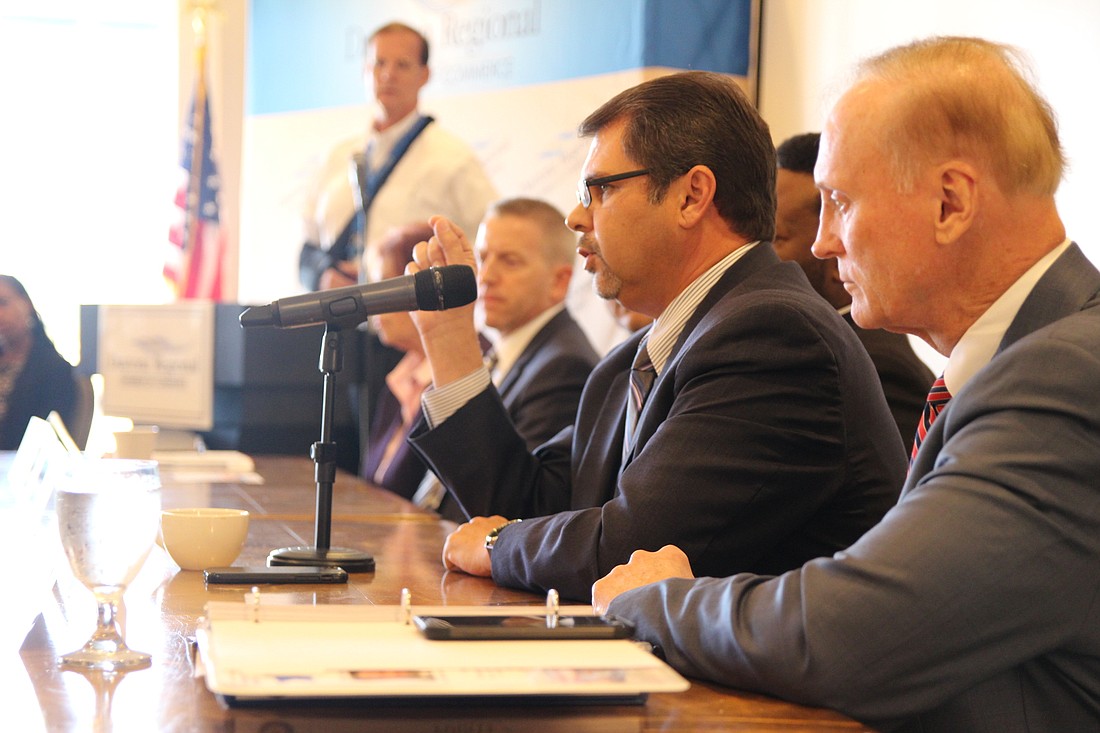- April 19, 2024
-
-
Loading

Loading

The elected officials representing Volusia County at the 2018 legislative session were "welcomed back" by the Daytona Chamber of Commerce at its 35th-annual Eggs & Issues breakfast, where they answered questions about significant bills, issues and their stances through the process.
The delegation was comprised of Sen. Dorothy Hukill, Sen. David Simmons, Rep. Tom Leek, Rep. Paul Renner, Rep. Patrick Henry and Rep. David Santiago. Sen. Travis Hutson was absent.
Here are three issues the delegation discussed.
An addition to the tax package, or House Bill 7087, concerned some County Council members at the meeting on April 3. It puts additional restrictions in county and municipality ability to tax residents, which could have an impact in Volusia County's proposed referendum to put half-cent tax increase on the November ballot for infrastructure.
The law forces cities and counties to conduct an audit by a certified public accounting firm to be posted online for public viewing 60 days before the referendum reaches ballot. It also places the Office of Program Policy Analysis and Government Accountability in charge.
When asked if this Volusia County can still add the half-cent tax referendum on the ballot, Renner said yes.
Renner, who was involved in putting the tax package together, said the addition was put in to increase transparency. If an agency is doing this for the right reasons, there should be no reason it shouldn't pass a CPA audit.
“Taxes should always be a last resort — Not a first resort, and this is simply a transparency piece to make sure everybody is informed before they vote yes," Renner said.
Senate Bill 7026, or the “Marjory Stoneman Douglas High School Public Safety Act," was approved by Gov. Rick Scott on March 9.
The bill established the Office of Safe Schools within the Department of Education, prohibited people under the age of 21and those suffering from mental health from owning and possessing a firearm, and gives sheriffs and school boards the option to begin a Coach Aaron Feis Guardian Program.
It passed the Senate with a close vote of 20-18 and the House by 67-50.
Leek, who voted in favor of the bill, said both the Republicans and Democrats worked together on the bill from the beginning because it was understood among them that the Legislature had to find a solution.
“What was brought forth was a very delicately balanced bill, and if any amendment, if we would’ve hung a single amendment on that bill, the entire thing would’ve crumbled and it would have failed," Leek said.
However, Santiago said the bill was not the "solve-all." It was the most difficult vote he's taken. He voted in favor.
"We need to do more," Santiago said. "I think we need to fund some more areas in this bill and time will tell. I think the Legislature over the next couple of years will continue to tweak this bill. We have to and get feedback from all.”
Simmons said the bill was a product of compromise. While he did not agree with various portions of the bill, namely the raising of the minimum age to own a firearm, he said he understood it was an advancement, and therefore voted in favor of the bill.
“It is not a perfect product, but it is a product we can all be proud of, and it is a product where we understand why certain of the members voted against it," Simmons said.
Renner also voted in favor of it. Hukill and Henry did not. Both said they favored the mental health aspects of the bill, but had reservations over the Guardian program. Henry said the votes came down to how the lawmakers viewed the U.S. Constitution as it related to gun rights and arming school personnel.
“We didn’t start with the good stuff," Henry said. "They threw two ‘poison pills’ in the bill.”
House Bill 631 dealt with the possession of real property and was signed by the governor on March 23. As it relates to beach access, it will impact every county — except Volusia — in defining public and private land on the shores. Volusia County obtained an exception.
The bill reads that a governmental entity may not adopt or keep in effect an ordinance that relies upon "customary use" of any part of the beach above the mean high water line unless the ordinance is based on a judicial declaration that affirms recreational customary use.
This means that beachfront property owners could prevent people from using the strip of beach in front of their homes.
But, Renner said the claim of customary use helps counties retain public access to beaches.
“That has not changed whatsoever with this bill," Renner said.
He added that the bill doesn’t change people’s rights to use the beaches, but the mechanism as to how those rights are established.
Leek pointed to Volusia County's fight to be exempted from this bill. Hukill said she was happy Volusia achieved it, but that it still impacts the rest of the state, which is economically important due to Florida's reliance on its beaches for tourism.
“What’s going to happen when we continue to spend money on beaches, and we do, and some of those beaches are no longer public?” Hukill said.
This story was updated at 3:30 p.m., April 13, to further clarify HB 631's impact on public access to beaches and why Rep. Patrick Henry and Sen. Dorothy Hukill voted against the school safety bill.